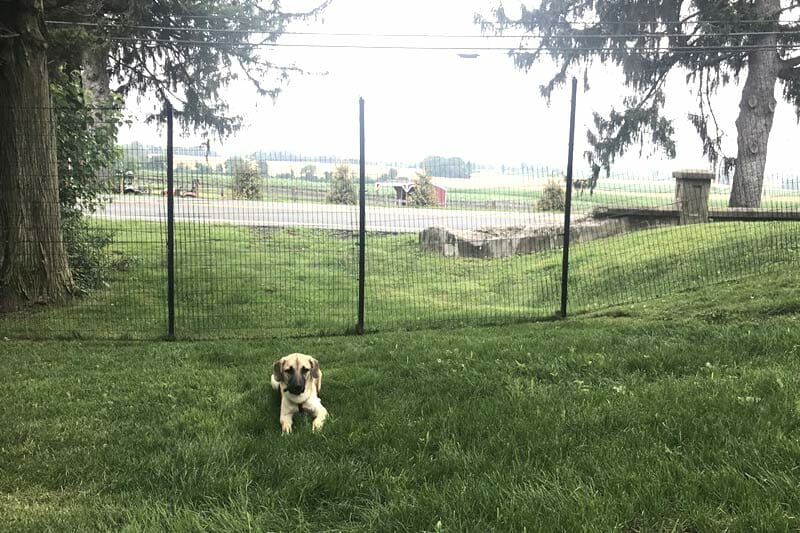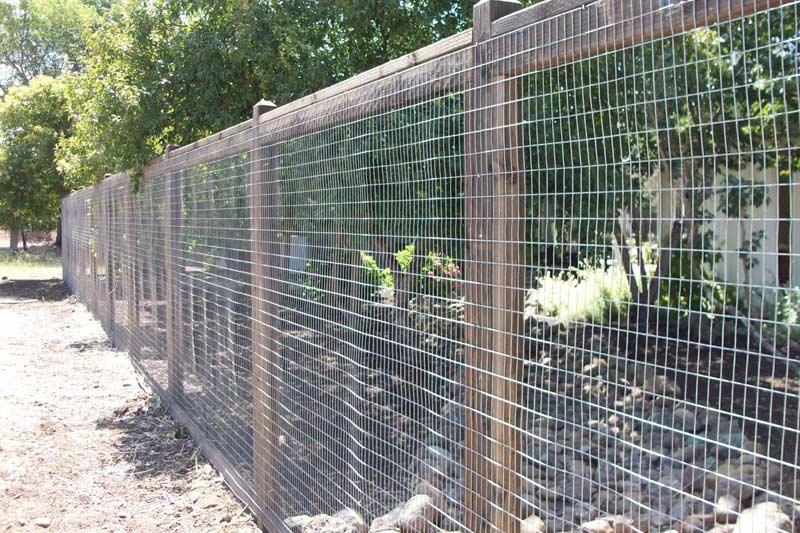Many individuals opt for a welded wire fence to increase their site’s security, deter clever animals from invading their gardens, or protect their premises from unwanted guests and trespassers.
The average cost for a welded wire fence can fall between $4 to $10. The cost can vary depending on the gauge size, the thickness, the height, its quality, and if you prefer to have it framed with wood.
Welded wire fences are among the most robust and impenetrable fence types. Regardless of the purpose that you want it to serve, be it agricultural, residential, or manufacturing, this type of fence is highly reliable.
What we cover
ToggleWelded wire fence cost per foot
Commonly used on farms and for construction, a welded wire fence is considered to be one of the safest types of fence. While it may be one of the most reliable, it is also considered to be among the most expensive types of fencing.
In installing a welded wire fence, the cost can average between $4 to $10 per linear foot.
Welded wire fence is created with a type of wire mesh that uses two layers of wire that is laid across one another at 90-degree angles, with their intersecting points welded together. With this, a very durable type of wire mesh is created.
Welded wire fence with posts cost
For the material alone in welded wire fencing, you can expect to spend around $0.65 to $2.75 per linear foot. This does not include the fence post, fastening clips, and other required materials necessary for the installation.
For reference, below are the average cost ranges for installing a welded wire fence depending on the height of the fence cost that they will be attached to. The average costs below are based on a 164 linear foot estimate.
| Fence Type and Height of Fence Post | Average Cost (Per Linear Foot) | Average Installation Cost (164 linear foot) | Entire Project Cost (164 linear foot) | Cost of Material (Fence Post Included) |
|---|---|---|---|---|
| Welded Wire Fence (with 8-foot fence post) | $4 to $8 per linear foot | $492 to $820 | $695 to $1367 | $203 to $547 |
| Welded Wire Fence (with 10-foot fence post) | $5 to $8 per linear foot | $492 to $820 | $758 to $1431 | $266 to $611 |
| Welded Wire Fence (with 18-foot fence post) | $5 to $10 per linear foot | $492 to $820 | $886 to $1559 | $394 to $739 |
How long do welded wire fences last?
The life span of your welded wire fence can depend on multiple factors. For instance, the construction of the wire itself can contribute to its lifespan, including its galvanization, and wire gauge.
Additionally, external factors such as proper installation, maintenance, local climate, and natural factors, can affect the health of your welded wire fence.
As a rule of thumb, your welded wire fence can stand for around 2 to 10 years.
For welded wire fence that is processed through a hot-dipped galvanized material before welding, you can expect a 5-year lifespan. For electro-galvanization, a 2-year lifespan is expected, and 8-10 years for a PVC surface-treated welded wire fence.
Is welded wire fencing good for dogs?
Welded wire fences can be strong enough that pet dogs cannot chew through or jump over them, especially for fences above 3 feet. Also, welded wire fences with plastic guards also make it hard for them to grip and climb over.
Welded wire or hog wire fences for dogs can be hazardous for your pets and can potentially injure your dog, especially if they can squeeze their heads through the holes.
For large dogs, welded wire fences can keep them inside your space if they persist in going out. However, it can be harmful for small dogs to be choked if they insist on poking through the holes.

Three alternatives to welded wire and their costs
Woven wire fence
Also known as “sheep fencing” or “page wire”, woven wire fencing is commonly used for keeping sheep, goats, and pigs.
Made of lightweight intersecting vertical and horizontal wires, this type of wire mesh is usually stretched between stakes or posts.
The average cost to install a woven wire fence can cost you around $1.48 to $1.85 per linear foot.
To add another layer of security to your woven wire fence, you can add one of two strands of barbed wire at the top.
Chain-link fence
A chain-link wire fence is made to be a lightweight and inexpensive fence but is robust enough to be effective as a boundary marker for pet spaces, small livestock, and for residential properties.
The average cost for installing a chain-link wire fence of a height of 4 feet can cost around $7 to $12 per linear foot.
Chain-link wire fences can be an effective and highly secure fence, especially when paired with barbed wires.
Hog wire fences
Popularly used for containing hogs and creating pens, hog wire fences are versatile enough that they can also be used for residential purposes.
The average cost to have a hog wire fence installed can range between $3 to $5 per linear foot.
Most of the time, hog wires are framed with wood and attached to wooden fence posts to have more visual appeal, especially in residential yards.
Popular uses of welded wire fence
For people who want to opt for woven wire fencing, but want to have a more visually appealing fence, a welded wire fence can be their choice. Although this type may be more decorative, it can also be made from industrial-grade materials.
This makes a welded wire fence a great choice for agricultural, commercial, and even residential uses.
Below are some of the popular uses for welded wire fencing:
- Is great a great fencing option for installing a boundary around gardens
- Can be a robust perimeter fence for commercial and residential properties
- For fencing around the community and residential pools and playgrounds
- Using industrial-grade materials, welded wire fences can also be used for military and security purposes
- Welded wire fencing can also be an alternative to cages for dogs or kennels
- Welded wire fences can be effective fencing for parks, nature reserves, and spaces for keeping animals
- For agricultural purposes, welded wire fencing is also effective for farm, ranch, or even livestock safekeeping














